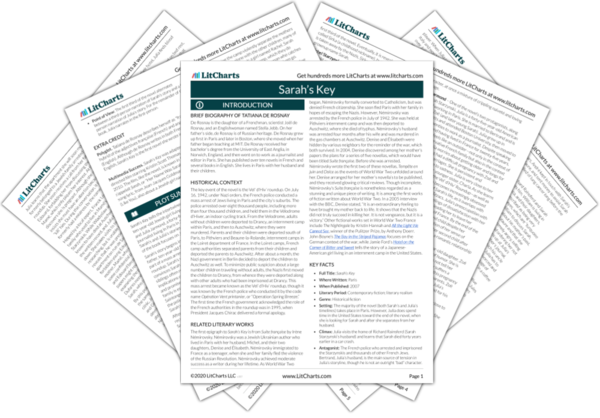Michel Starzynski Quotes in Sarah’s Key
She couldn’t bear the idea of him waiting in the dark. He must be hungry, thirsty. His water had probably run out. And the battery on the flashlight. But anything was better than here, she thought. Anything was better than this hell, the stink, the heat, the dust, the people screaming, the people dying.

Unlock explanations and citation info for this and every other Sarah’s Key quote.
Plus so much more...
Get LitCharts A+She had grown up too much to be afraid anymore. She was no longer a baby. Her parents would be proud of her. That’s what she wanted them to be. Proud because she had escaped from that camp. Proud because she was going to Paris, to save her brother. Proud, because she wasn’t afraid.
She fell upon the tar with her teeth, gnawing at her mother’s minute stitches. Finally, the yellow piece of cloth fell away from the blouse. She looked at it. Big, black letters. JEW. She rolled it up in her hands.
“Doesn’t it look small, all of a sudden?” she said to Rachel.
All of a sudden, every ounce of hope she still harbored within her ran out. In the old lady’s eyes she read what she most dreaded. Michel was dead. Dead in the cupboard. She knew. It was too late. She had waited too long. He had not survived. He had not made it. He had died there, all alone, in the dark, with no food and no water, just the bear and the storybook, and he had trusted her, he had waited, he had probably called out to her, screamed her name again an again, “Sirka, Sirka, where are you! Where are you?” He was dead, Michel was dead. He was four years old, and he was dead, because of her.
I cannot bear the weight of my past.
Yet I cannot throw away the key to your cupboard.
It is the only concrete thing that links me to you, apart from your grave.

Michel Starzynski Quotes in Sarah’s Key
She couldn’t bear the idea of him waiting in the dark. He must be hungry, thirsty. His water had probably run out. And the battery on the flashlight. But anything was better than here, she thought. Anything was better than this hell, the stink, the heat, the dust, the people screaming, the people dying.

Unlock explanations and citation info for this and every other Sarah’s Key quote.
Plus so much more...
Get LitCharts A+She had grown up too much to be afraid anymore. She was no longer a baby. Her parents would be proud of her. That’s what she wanted them to be. Proud because she had escaped from that camp. Proud because she was going to Paris, to save her brother. Proud, because she wasn’t afraid.
She fell upon the tar with her teeth, gnawing at her mother’s minute stitches. Finally, the yellow piece of cloth fell away from the blouse. She looked at it. Big, black letters. JEW. She rolled it up in her hands.
“Doesn’t it look small, all of a sudden?” she said to Rachel.
All of a sudden, every ounce of hope she still harbored within her ran out. In the old lady’s eyes she read what she most dreaded. Michel was dead. Dead in the cupboard. She knew. It was too late. She had waited too long. He had not survived. He had not made it. He had died there, all alone, in the dark, with no food and no water, just the bear and the storybook, and he had trusted her, he had waited, he had probably called out to her, screamed her name again an again, “Sirka, Sirka, where are you! Where are you?” He was dead, Michel was dead. He was four years old, and he was dead, because of her.
I cannot bear the weight of my past.
Yet I cannot throw away the key to your cupboard.
It is the only concrete thing that links me to you, apart from your grave.











